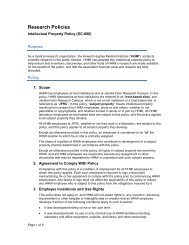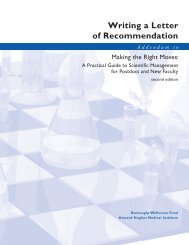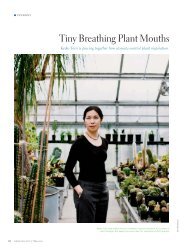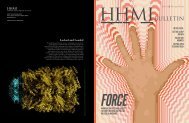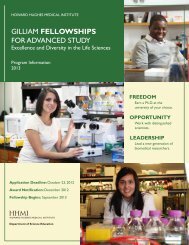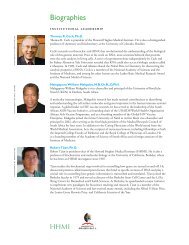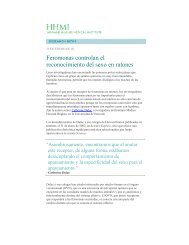Training Scientists to Make the Right Moves - Howard Hughes ...
Training Scientists to Make the Right Moves - Howard Hughes ...
Training Scientists to Make the Right Moves - Howard Hughes ...
Create successful ePaper yourself
Turn your PDF publications into a flip-book with our unique Google optimized e-Paper software.
<strong>Training</strong> <strong>Scientists</strong> <strong>to</strong> <strong>Make</strong> <strong>the</strong> <strong>Right</strong> <strong>Moves</strong><br />
Participants would have liked more discussion about how <strong>to</strong> develop a<br />
strong basic science research program in a clinical department, how <strong>to</strong><br />
improve time management skills, and how <strong>to</strong> address <strong>the</strong> burnout associated<br />
with having a demanding schedule. One person suggested that future<br />
speakers address <strong>the</strong> following two issues specifically: What are <strong>the</strong> 10 most<br />
common problems that a physician-scientist will encounter? How should a<br />
physician-scientist deal with <strong>the</strong>se problems?<br />
THE 2005 COURSE EVALUATION:<br />
PROCESS AND OUTCOMES<br />
The method for evaluating <strong>the</strong> 2005 course was generally similar <strong>to</strong> that for<br />
<strong>the</strong> 2002 course. Participants completed an evaluation for each session as<br />
well as for <strong>the</strong> entire course. However, no postcourse focus group with participants<br />
was held. Instead, course organizers obtained feedback from representatives<br />
of <strong>the</strong> organizations in <strong>the</strong> Partners in Scientific Management<br />
Program, who met several times during <strong>the</strong> course with course organizers <strong>to</strong><br />
share <strong>the</strong>ir observations about course format and content.<br />
Results from <strong>the</strong> evaluation completed by participants immediately after<br />
<strong>the</strong> 2005 course are presented below. (Because BWF and HHMI do not<br />
intend <strong>to</strong> hold <strong>the</strong> course again, evaluations at six months and at one year<br />
are not planned.)<br />
Overall Impressions of <strong>the</strong> Course<br />
Ninety-one of <strong>the</strong> 100 participants in <strong>the</strong> 2005 course completed <strong>the</strong> overall<br />
course evaluation. The course was very well received by participants; more<br />
than 90 percent of respondents considered <strong>the</strong> overall quality of <strong>the</strong> course<br />
content, <strong>the</strong> relevance <strong>to</strong> <strong>the</strong>ir roles as scientific managers, and <strong>the</strong> opportunities<br />
for networking as “excellent” or “very good.” More than 90 percent<br />
of participants who had labs said <strong>the</strong>y expected <strong>to</strong> change <strong>the</strong> way <strong>the</strong>y<br />
manage <strong>the</strong>ir labs. One participant, for example, noted “[<strong>the</strong> course] has<br />
motivated me <strong>to</strong> think about how I manage, instead of just letting things<br />
happen.” O<strong>the</strong>r participants reported feeling more confident and prepared<br />
as a result of attending <strong>the</strong> course. Postdoc<strong>to</strong>ral-level participants considered<br />
<strong>the</strong>mselves more likely <strong>to</strong> use <strong>the</strong> course information than participants<br />
who were junior faculty; M.D.s reported a greater intention <strong>to</strong> use <strong>the</strong><br />
course information than did M.D./Ph.D. or Ph.D. participants. Ninetyseven<br />
percent of respondents said <strong>the</strong>y would recommend <strong>the</strong> course <strong>to</strong><br />
colleagues. When asked <strong>to</strong> identify <strong>the</strong> single most important component of<br />
<strong>the</strong> course, participants mentioned <strong>the</strong> following:<br />
Advice and perspectives of senior investiga<strong>to</strong>rs combined with <strong>the</strong><br />
experience of outside consultants<br />
Opportunity <strong>to</strong> talk with and hear from o<strong>the</strong>rs in <strong>the</strong> same situation<br />
Opportunity <strong>to</strong> learn strategies for lab leadership and management in a<br />
formal way and gain insights in<strong>to</strong> personality types and methods for<br />
developing lab workers<br />
114




